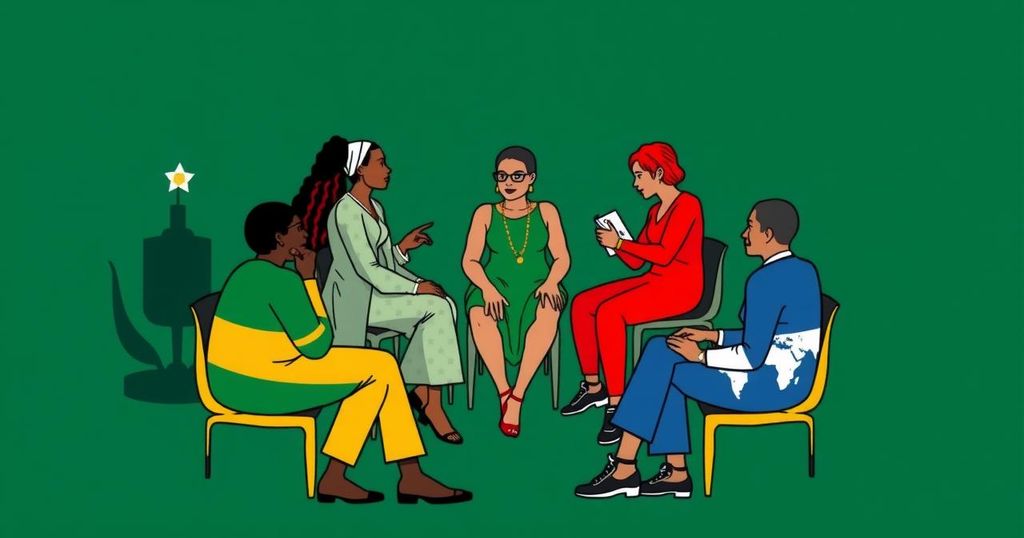The Commonwealth Heads of Government Meeting convened in Samoa, focusing on crucial topics such as climate change and the demand for reparations related to the transatlantic slave trade. With participation from 56 Commonwealth nations, leaders engaged in discussions addressing the existential threat of climate change, particularly for vulnerable island states, while also tackling the complex issue of reparations for historical injustices faced by affected communities.
The leaders of the Commonwealth nations convened in Samoa for the Commonwealth Heads of Government Meeting (CHOGM), where critical discussions on climate change and reparations for the transatlantic slave trade took center stage. With participation from 56 nations, including Britain’s King Charles, the summit commenced with a welcome banquet on Thursday and a series of dialogues led by foreign ministers. One significant concern raised by member nations is the profound impact of climate change, particularly on small island states that are increasingly threatened by rising sea levels. UN Secretary-General Antonio Guterres highlighted that ocean temperatures in the Pacific Islands are surging at an alarming rate, stressing that these regions face unique vulnerabilities. Australian Foreign Minister Penny Wong articulated the gravity of climate change as an existential threat that ranks as the number one national security and economic concern for Pacific nations and other Commonwealth members. Moreover, representatives from several African nations, including Zambia, underscored the escalating challenges posed by climate change, notably its adverse effects on food security. As the summit progressed, leaders sought to deliver a declaration focusing on ocean protection amid growing environmental anxieties. In parallel, the contentious issue of reparations for Britain’s historical role in the transatlantic slave trade emerged as a focal point of discussion. The push for reparations has garnered renewed attention, particularly within the Caribbean Community (CARICOM) and the African Union. British Prime Minister Keir Starmer indicated that the UK government would refrain from introducing the topic at the summit but expressed willingness to engage in dialogue with those interested in discussing reparations. CARICOM has established a commission aimed at pursuing reparations from former colonial powers. Contrasting opinions exist on the matter; some argue that contemporary nations should not bear responsibility for historical injustices, while others contend that the legacy of slavery has resulted in enduring racial disparities that necessitate reparative measures. According to a source from CARICOM, CHOGM represents a critical opportunity for discussion on reparations, reinforcing the importance of open dialogue regarding the legacies of colonial atrocities. It is recorded that between the 15th and 19th centuries, approximately 12.5 million Africans were forcibly transported and sold into slavery across the Americas, primarily in Brazil and the Caribbean, where they endured horrendous conditions while their labor predominantly benefited others.
The Commonwealth Heads of Government Meeting (CHOGM) brings together leaders of the Commonwealth nations, which have historical ties to the British Empire. The summit provides a platform for member countries to engage in discussions about pressing global issues, such as climate change and historical injustices, including the legacy of the transatlantic slave trade. The vulnerability of many small island nations to the impacts of climate change has made it a focal point for advocacy and action among Commonwealth members. The question of reparations for slavery has gained traction in recent years, especially among Caribbean leaders who seek acknowledgment and compensation for the historical injustices faced by their ancestors. This complex intersection of climate resilience and socio-economic equity frames much of the dialogue at the summit.
In summary, the Commonwealth leaders’ meeting in Samoa underscores the urgent need to address climate change and consider reparations for historical injustices. With many member nations contending with the dire effects of climate change, leaders are emphasizing the significance of collaboration and proactive measures to safeguard vulnerable populations. The discussions around reparations further reflect a crucial dialogue about the responsibilities of former colonial powers in rectifying the enduring impacts of slavery. The outcome of these deliberations may shape ongoing efforts to achieve justice and sustainable development within the Commonwealth.
Original Source: www.swissinfo.ch






